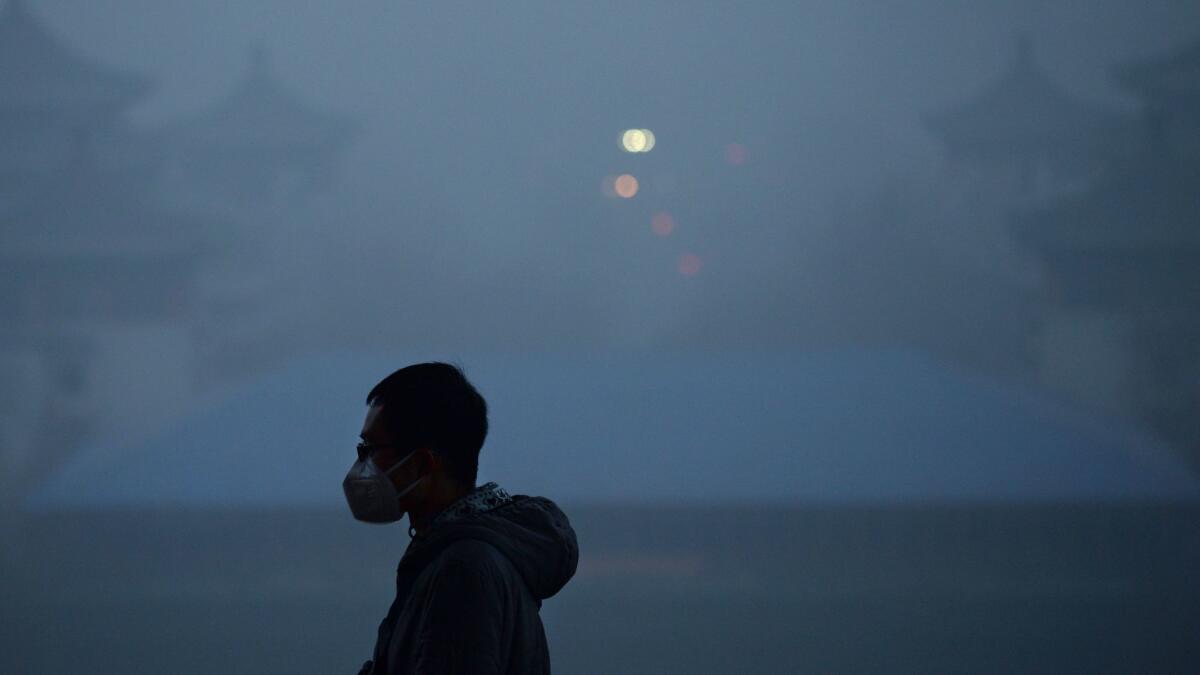As U.S. retreats on climate goals, China launches the world’s biggest carbon trading market

- Share via
Reporting from BEIJING — China launched a nationwide carbon-trading program Tuesday, solidifying the country’s role as an emerging leader in the fight against climate change.
The market will initially cover about 1,700 of the country’s coal- and natural-gas-based power-generating companies, accounting for about 3 billion tons of carbon dioxide emissions a year — more than a third of the country’s total, China’s powerful National Development and Reform Commission announced at a news conference.
The Chinese carbon market will be the world’s biggest — about 1.5 times as large as the second-biggest, the European Union, and several times bigger than California’s, which is the biggest in North America.
“This is an incredibly ambitious exercise,” said Nathaniel Keohane, a vice president at the Environmental Defense Fund, a New York-based nonprofit that has helped China devise the program. “It’s like the pyramids of Giza.”
Keohane said the plan could enable China — the world’s biggest greenhouse gas emitter — to formulate even more ambitious climate goals in coming years.
Experts say that China is assuming the climate leadership role from the U.S., which has been retreating on its climate advocacy since President Trump’s inauguration in January. Trump, who has repeatedly cast doubt on the existence of human-induced climate change, announced in June that the U.S. would quit the Paris climate accord; on Monday, in a wide-ranging national security speech, he dropped climate change from a list of global threats.
California is among several states that have shunned Washington’s position on the issue; in June, Gov. Jerry Brown traveled to China and signed a nonbinding agreement with Beijing to limit greenhouse gases.
China’s carbon market will initially apply only to the power-generation industry but will later expand to cover seven other sectors, including petrochemicals, chemicals, building materials, and iron and steel.
The Chinese government will spend a year building a nationwide registration system covering all companies participating in the market, the state-run China Daily reported. It will spend another year testing the system, and actual transactions will begin in about three years.
“I don’t think we should be surprised that China is proceeding fairly thoroughly and methodically,” Keohane said. “I think that’s a good thing — it means they’re intent on getting it right.”
An emissions trading program is, essentially, a market-based incentive system to reduce greenhouse gas emissions. It involves setting a limit on total carbon emissions, and then — within that limit — allowing polluting companies to buy “carbon credits” from their less-polluting counterparts, thereby imposing a financial burden on the polluters and granting rewards to cleaner entities.
Proponents say that the system is more efficient than strict, across-the-board emissions limits, and prevents enterprises from shunting the costs of environmental pollution to the public.
At a 2015 meeting with President Obama in the run-up to the Paris climate accord, Chinese President Xi Jinping pledged to launch the market in two years. It will build on seven regional pilot programs that were approved in 2011.
Although pollution remains a serious concern across China, the government’s anti-pollution efforts — and by extension, its climate mitigation efforts — are gaining strength.
Much of it can be traced back to Xi’s environmental record. “Clear waters and green mountains are as valuable as mountains of gold and silver,” Xi once said, and the expression has become standard in government propaganda and state media reports.
In October, the Communist Party elevated Xi to become the country’s most powerful leader since Mao Tse-tung.
Beijing’s skies have been unseasonably blue in recent weeks, in part because of favorable weather, but also because local officials in neighboring provinces banned coal use, despite a lack of alternative energy sources. After natural gas prices increased — and many people complained of going without heat in chilly weather — officials partially rescinded the ban.
Experts say the carbon market’s success is not assured — China is beleaguered by limited monitoring and verification capabilities, a lack of transparency, and a politically influenced legal system.
“Putting a price on carbon is the right signal to send in this … blue-sky-deprived world,” said Li Shuo, senior global policy advisor at Greenpeace East Asia. “By doing so, Beijing also positions itself ahead of major industrialized countries, many of whom are still seeing climate action as a burden rather than an opportunity.”
“However, with the announced system far from as comprehensive as it originally set out to be, much work still lies ahead,” he continued. “With the system now expanded to cover the entire country, local capacity also needs to catch up.”
For more news from Asia, follow @JRKaiman on Twitter
Nicole Liu in The Times’ Beijing bureau contributed to this report.
More to Read
Sign up for Essential California
The most important California stories and recommendations in your inbox every morning.
You may occasionally receive promotional content from the Los Angeles Times.










